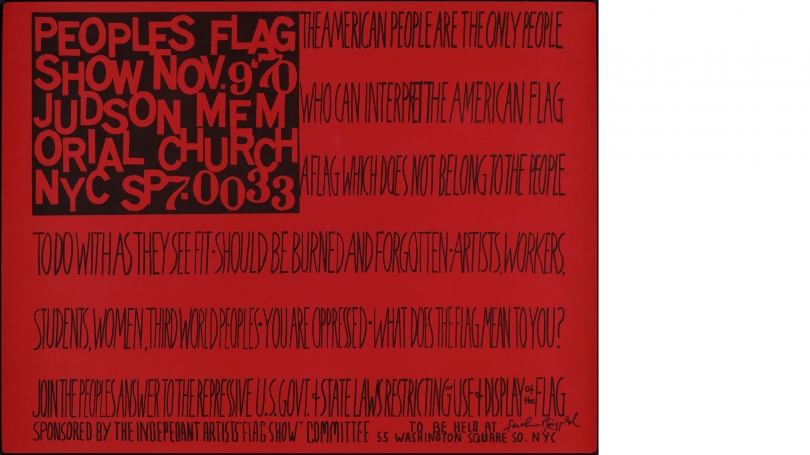The Hood Museum of Art is delighted to add to its collection two important works on paper by the celebrated African American artist Faith Ringgold (Amercian, born 1930). Ringgold is best known for her decades-long series of narrative quilts, in which she fuses her training in the fine arts with the quilt-making and storytelling traditions of her family and heritage. This important body of work was preceded by a series of posters and paintings Ringgold made in the 1960s and early 1970s that addressed issues of racism, censorship, and gender inequality. In 1970, Ringgold was arrested, along with fellow artists John Hendricks and Jean Tuche, for her participation in the "People's flag show" exhibition at the Judson Memorial Church on Washington Square Park. The Judson Three, as they became known, had used their work to protest against repressive laws on the use and display of the American flag. The attorney general's office charged the three artists with desecration of the flag and closed the exhibition, for which Ringgold designed this red and black poster. The Judson Three were subsequently acquitted of all charges on appeal, with the help of lawyers provided by the American Civil Liberties union, in a case that highlighted the need for freedom of speech in the arts.
United States of Attica represents Ringgold's tribute to the thirty-nine people who died in the police raid on Attica Correctional facility in New York on September 13, 1971. Approximately one thousand prisoners protested the horrific living conditions at Attica by taking control of the prison and holding thirty-three staff members hostage. During four days of negotiations, authorities agreed to twenty-eight of the prisoners' demands, but would not agree to a complete amnesty from criminal prosecution for the prison takeover. On the order of Governor Nelson Rockefeller, state police took back control of the prison by force, resulting in the bloodiest one-day encounter between Americans since the Civil War. In response to the Attica massacre, Ringgold diligently researched incidents of genocide and murder throughout American history and recorded them on a map of the United States. Indeed, the poster invites others to contribute further documentations of brutalities committed under the auspices of the United States government or from the time the colonies were first settled. The poster's vibrant red and green colors reference Marcus Garvey's Black Nationalist flag, a symbol of black liberation in the civil rights era. Together, these works, the first by Ringgold to enter the collection, will be used for teaching across campus, including African and African American studies, Art History, Government, Studio Art, and many other departments at Dartmouth.
Related Exhibitions
- Still We Rise: Women of Color, Existence/Resistance in Contemporary Art
- Witness: Art and Civil Rights in the Sixties
- Word and Image in Contemporary Art
- Text as Image / Image as Text: Narratives of African American History and Identity

